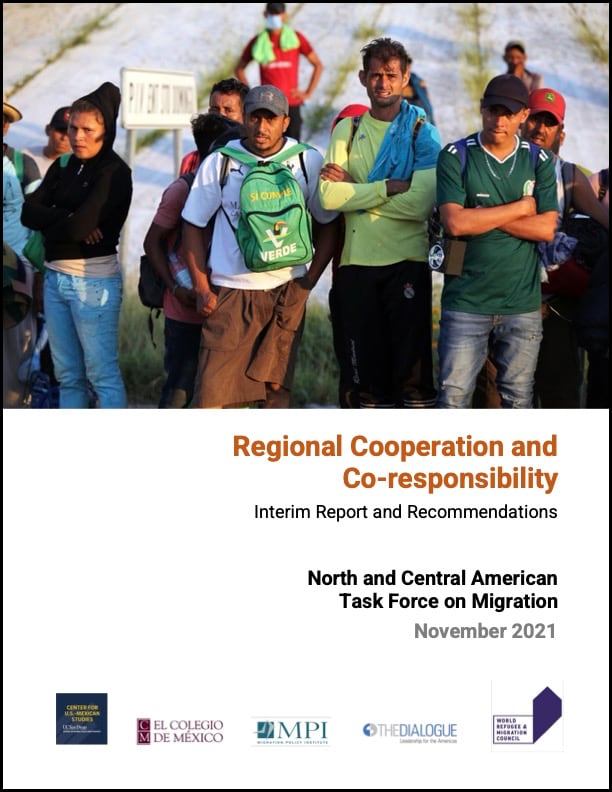Interim Report and Recommendations — North and Central American Task Force on Migration

Central to the vision of the Task Force’s work is a belief that migration issues in Central and North America require a comprehensive regional approach. The issues are simply too complex to be dealt with by any one country acting independently. Countries throughout Central and North America, all of whom are impacted by multidirectional migration flows, have essential roles to play in addressing the causes of migration and formulating appropriate response policies. It is time to build the foundations for a regional migration system based on co-responsibility to foster the common goal of safer, more orderly, regular migration and to address the causes that have forced so many to seek protection and economic security in other countries. Countries in the region are interdependent; for example, Canada, the United States and Mexico all have aging populations and immigration is needed to grow — and even maintain — economies. Establishing a strong regional migration initiative can reduce mounting pressures on governments while providing regular and safer channels for migrant populations.
In the spirit of the global compacts on migration and refugees, we believe that migration is a shared responsibility. Strengthening regional co- responsibility mechanisms in Central America for migrants and refugees not only offers a new lens for responding to migration in the region but will also contribute to enhanced responsibility-sharing at the global level as called for in the Global Compacts on Refugees and on Safe, Orderly and Regular Migration.
And it’s not just up to governments to propose creative approaches. As the World Refugee & Migration Council recommended in its 2019 report, Appel á l’action : transformer le système mondial d’aide aux réfugiés, we need to build a constellation of international players working in networks to identify solutions and promote their adoption. One of the strategies to counter the increasingly frequent and unilateral “might-is-right” behaviour is to reconfigure global migration governance to enable more flexible arrangements, coalitions, and networks that draw together the constructive actors in our global community.
We are encouraged by the Biden administration’s development of both a Collaborative Migration Management Strategy that emphasizes cooperation with countries in the region to address migration — a first in US history — and by a Root Causes Strategy to tackle the long-standing systemic drivers of migration (NSA 2021a, 2021b).
We also recognize that we are not starting from scratch.
The Americas have a long history of regional cooperation embodied in organizations, such as the Organization of American States and the Central American Integration System (SICA). In the 1980s, the US-Mexico Binational Commission strengthened dialogue between cabinet officials of the two countries, including on migration. In the 1990s, a collaborative process known as CIREFCA (see box) was successful in supporting solutions for almost 2 million people displaced by the civil wars in El Salvador and Guatemala. And today there are many regional initiatives to respond to migration — from the regional consultative process known as the Puebla process to the more recent Comprehensive Regional Protection and Solutions Framework (MIRPS). We are encouraged by SICA’s adoption of the Comprehensive Regional Social Policy 2020- 2040, given its regional scope and high-level governmental engagement and urge support for its implementation. These are all important initiatives, and we commend their efforts to bring the governments of the region together with other actors to respond to migration.
However, for the most part, these institutions were established decades ago to meet the needs at the time. A more recent and useful cooperative framework is the MIRPS, which is a major intergovernmental initiative in the application of the Comprehensive Refugee Response Framework (CRRF) and a concrete contribution to the Global Compact on Refugees that aims to encourage “regional cooperation between countries of origin, transit and destination, to foster responsibility-sharing on matters related to prevention, protection and durable solutions.” However, MIRPS has a limited mandate and does not address the broader, complex challenges and needs posed by migration. Even though the plethora of organizations has created a certain institutional fatigue in the region, the reality is that the current institutions are not meeting the need for a strong regional approach to migration.
This report is informed by the research papers prepared on regional cooperation by María Eugenia Anguiano Téllez, Colegio de la Frontera Norte (Organizaciones regionales y migración en Centroamérica), and by Ariel Ruiz Soto, Migration Policy Institute (Strengthening Regional Cooperation on Migration from Central America: Possible Ways Forward).
Le Groupe de travail sur la migration en Amérique du Nord et centrale is a non-governmental forum of academics, civil society and business leaders, and former policymakers in dialogue with current government officials created to facilitate a broadly driven solution dialogue among the countries involved in the crisis of migration and forced displacement in the region. Initiated by the World Refugee & Migration Council with the Center for U.S.-Mexican Studies, El Colegio de México, the Migration Policy Institute and the Inter-American Dialogue, the task force will issue concrete recommendations for collective, regional action based on evidentiary research to promote responsibility sharing across North and Central America.

